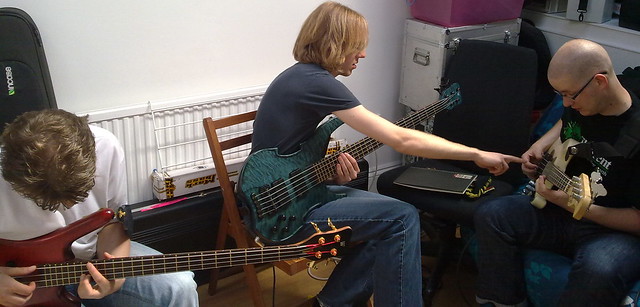
Serious about studying music? Here’s some tips. Take or leave them as you find them useful. Your college years are both very limited and very expensive. Don’t waste them:
- Take extensive notes on everything, (but maybe try and work out a system for sorting through them – two useful resources here and here.) Srsly, there is literally no way that you’ll remember everything important from your classes. Note taking is NOT optional…
- Record every time you play – video if possible. Review it, learn from it, put the best bits online if that feels useful to you.
- Collaborate as much as possible – stepping outside your comfort zone can be an amazing learning experience.
- Get your course work done early – focus on the learning outcomes and marking criteria, hit all of those, then think about the things that your own practice needs to get out of the module.
- Learn how to write essays – google for advice, there are tons of great articles giving tips on this – there are a couple to get you started here, here and here.
- Ask questions – never let any teacher make you feel bad about needing more information.
- Keep a blog – it’s great writing practice, and is a space to try out ideas and start to build an audience. Writing publicly can really help focus your mind on whether your ideas are nonsense or not!
- If you play an electric instrument, get a headphone amp, carry it with you so you can practice whenever you get spare time. Swap favourite practice ideas with other students. It also means you won’t be taking up a practice room that a band might need just so you can run scales through an amp. (If you play bass or electronic Drums, get a Backbeat! Headphone amp, IEM pack and wearable subwoofer in one!)
- Go to gigs – big and small. Support your local scene, get to know who runs the venues and books the shows.
- Play live as often as possible – gigs, open mics, jam sessions – get out and play.
- Spend as much time in the studio as possible. If your college has a studio, book any spare time you can in there.
- Start recording at home, and work on measurable week to week improvement. if all you’ve got to record on is your phone, get better at positioning it in relation to your instrument to get the best sounds you can. Learning to maximise the possible quality of lo-tech recordings will pay MASSIVE dividends down the line.
- Watch as many tutorials about how to work in the studio as you can.
- Invest in your music life. Booze and cigarettes are not an investment in your music life. Records, gear, strings, gig tickets, travel to go and play with new people are.
- Listen to at least one new album (released in the last two years) a week.
- History matters more than nostalgia – use YouTube to fill in the history of your instrument – look up at least three new-to-you important players a week. It really is the greatest learning resource humanity has yet invented, if only all that genius content wasn’t hidden behind towering mountains of bullshit.
- Read books. Lots and lots of books. Use the college library, find out about journal access through your course. (your essays WILL be marked down if your only references are blogs – books matter.)
- Monitor your social media time, but work on your online presence as an artist/professional.
- Spend precisely no time worrying about music you don’t like. Learn what you need to learn for the course, but cultivate your relationship with the music you’re passionate about. Keep your ears open to new sounds – weird doesn’t necessarily mean bad, often it means unfamiliar…
- Remember, your peers are not competition, they’re comrades. Learn from everyone, be generous in sharing your own learning. Swap skills with everyone, trade lessons for guitar repairs, studio time for web skills.

Regarding. the gems to be found on You Tube: “hidden behind towering mountains of bullshit” LOL. It’s also best not to waste your time reading comments on You Tube (or any other antisocial media platform, for that matter). The negativity will consume you and sour the experience of whatever genius video you’ve just watched!